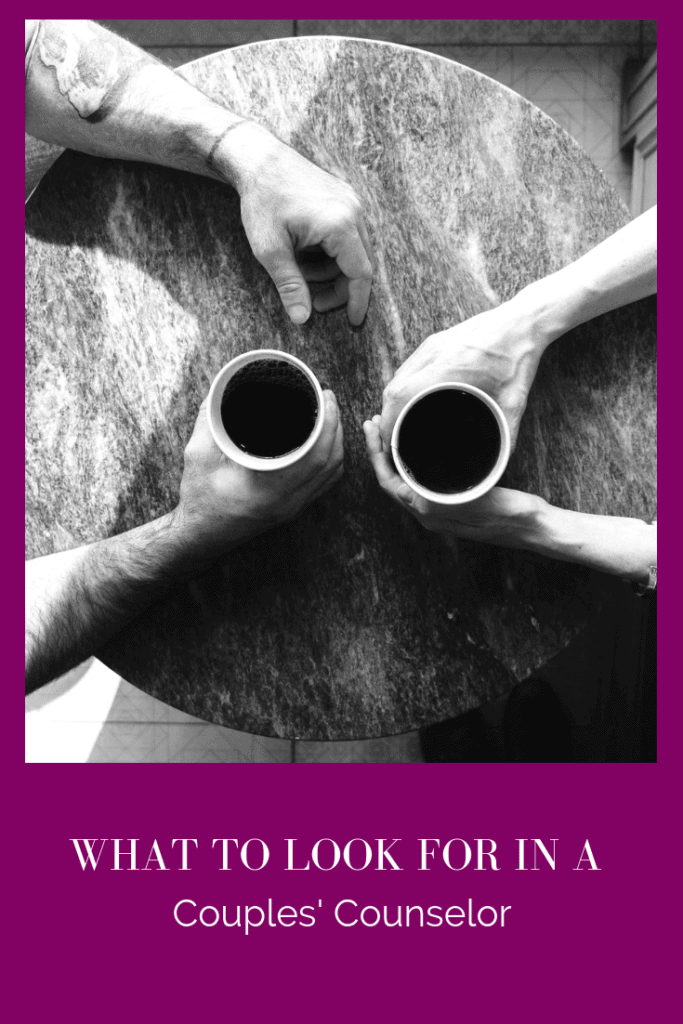
Finding the right couple’s counselor is a lot like dating to find the right partner. You’ve got to have that great fit: personalities that mesh, as well as cultural and intellectual compatibility. I always spend time on the phone with prospective clients not to find out so much who they are, but to let them know who I am. I need them to know what I’m about, my overall philosophy and my expectations. Time and money for most couples these days feels very limited. It’s important not to waste anyone’s time, if possible. So, spend a few minutes on the phone and interview possible therapists. Get a feel before making that first appointment.
With that in mind, here’s a list of all the things I think you need to know when looking for a great couple’s counselor. After that, I’m going to answer some of the most commonly asked questions you’ve asked about finding the right couple’s counselor.
- Do not pick someone based on time availability or price– pick someone on fit! This is not the time to bargain shop or find someone who has openings later today (if they do, I hate to say it, but they’re likely not so great or they’d be more booked). If couple’s therapy is going to work, it needs to be a priority for you. That might mean getting off of work early a few times or giving up something else you like to do while you’re in therapy, so you have more flexibility.
- Find someone with flexibility about counseling sessions and/or how often you meet. I’m not a fan of therapists who charge whether you come or not every week. These are folks, in my opinion, who are too focused on money and you being in a “slot.” If you give proper notice for missing a session, you shouldn’t be charged to “hold the slot.” (as long as you don’t constantly miss). How often you meet should also be flexible. I generally meet with couples every other week for an hour-and-a-half. Sometimes we go three weeks and occasionally I meet every week with a couple. How often we meet depends on the couple and their needs, not any rigid idea of what has to work.
- Make sure the couples’ therapist brings up how you work your finances as a couple. For some couples, money isn’t an issue but, for the majority there’s something about money that affects them. Either way, the subject should be broached.
- Your couple’s therapist should also be very comfortable talking about your sex life with you. Not just the sex itself, but other physical touching and chemistry too. I don’t generally talk about sex the first time I meet with couples since I like to build trust first, so we can have a more meaningful conversation about this intimate topic. However, I always talk about sex at some point.
- Make sure the therapist is dedicated to each of you feeling happy and fulfilled. If their only agenda is to keep the marriage together or if they feel that divorce is an easy option, then this isn’t the person for you. It’s not their job to keep your marriage together. It’s their job to make sure you have no regrets moving forward and that you feel clear about whatever you do next.
- You shouldn’t feel like your couple’s therapist take sides. If you leave the session every time feeling like you weren’t listened to or “heard” then there’s a problem. If you leave feeling like you’re always wrong and that they like your partner better, there’s a problem.
- If you give a boundary (“I don’t want to talk about that right now” or “No, I don’t want to be given an ultimatum of when I’m deciding about staying in the marriage”) and they push or don’t adhere to your boundary – this isn’t a good fit for you.
- Talking about issues is fine, but you want a therapist who gives you specific strategies and tips for changing your relationship, and coaches you about how to use them consistently and effectively.
- If you have a drug or alcohol problem (or think you do), you want to see someone who has experience with chemical dependency. If you had cancer, you wouldn’t just see your primary care physician, you’d want to see an oncologist – someone who specializes in cancer. It’s the same here.
- Related to this, make sure they know about marriage research (there’s a lot these days) and that they’ve had some experience with couples. You’ve got to start somewhere, I know, but make sure the person is seasoned on some level.
- While I occasionally let couples have an argument in the room with me, this is not a regular practice. I do it so I can “see how they fight” and what their patterns are. However, your therapist should not let you and your partner engage in angry exchanges repeatedly during your sessions. You’ll just leave angry and upset and it won’t get you anywhere.
- I always spend the first session with a couple getting some background, family-of-origin information because, of course, our past influences our current relationships. However, the focus in couples’ counseling should be on how to deal with your current marital problems. This isn’t a time to focus on gaining insight into how you developed these problems. That work is for individual therapy.
- Make sure you set concrete goals for therapy. If you don’t have a clear goal, how will you know if you’re making progress?
- Whoever you pick, make sure they carry hope, not cynicism. I meet with so many couples who are suffering from battle fatigue. Maybe I’m the last in a long line of therapists. Maybe they’ve made changes before, but they didn’t stick and they’re feeling hopeless or helpless. I see it as my job to carry the hope when they can’t.
- You want to leave couples therapy, the majority of the time, feeling hopeful! If this isn’t happening, this likely isn’t the right person for you! Don’t schedule the second appointment right away. Go home and discuss the session first. I actually don’t allow couples to make their second appointment when we’re at the end of the first one. I tell them to go home, try out some of the techniques they’ve learned and see if they think this is all a good fit. Many couples say to me, “But we don’t want to lose momentum.” Don’t make another appointment out of fear. If it ends up falling off the radar, then it wasn’t going to work anyway! This is your first decision as a couple who’s working on their relationship. Make it together without the pressure of the therapist in the room.
- Don’t schedule sessions at the end of a long day. If it’s a priority, make it one and take some time off work or wherever to make it happen. This shouldn’t be the last priority crammed into the end of your full life. Make this (and your relationship) a top priority and schedule your sessions when you have energy to truly do some constructive work.
While those are my “top rules” for finding the right couple’s counselor, I also routinely get asked a bunch of other questions that I wanted to answer right here.
Question 1: What’s best, a PhD or Masters Level?
Answer 1: There’s not a “best degree” for couples counseling. What’s best is someone who has experience working with couples.
Question 2: Can my individual therapist take over as couple’s therapist?
Answer 2: Sometimes it’s appropriate for a therapist who has been doing the individual work with one partner to move into couples work with both people. But sometimes a new therapist is needed because the partner feels at a disadvantage if he or she goes into sessions where the therapist already has a relationship with the spouse. It’s essential that the decision about who to see for treatment is a careful and shared one.
Question 3: Can I see my couple’s counselor alone?
Answer 3: Yes, you and/or your partner can have individual sessions with your couple’s counselor but it’s important that this gets talked about in a couple’s session. All of you should decide together if this is a good course of action and what the parameters will be.
Question 4: How do I find a great couple’s counselor?
Answer 4: Just like with dating, getting a recommendation from a friend is the best way to start. This person will likely be a good fit for you if your friend likes them.
Question 5: Is it important to have a counselor like myself? If I’m gay, black, Jewish, polyamorous, should my counselor be the same?
Answer 5: My simple but complicated answer is “yes and no.” If you can find an experienced couple’s counselor who has some cultural pieces similar to your own, I think it only enhances the process. However, I’ve worked with people from just about every walk of life and had great successes.
Question 6: How long should we be in therapy?
Answer 6: You should see some progress after the first two to three sessions for sure. If you don’t see improvements or movement, be sure to discuss this with your therapist. As long as you’re progressing, stay in therapy. If things become too stagnant, it’s likely time to end (at least for awhile). Personally, I don’t have “final sessions” with clients. I leave the door open to come back if “tune ups” are needed.






